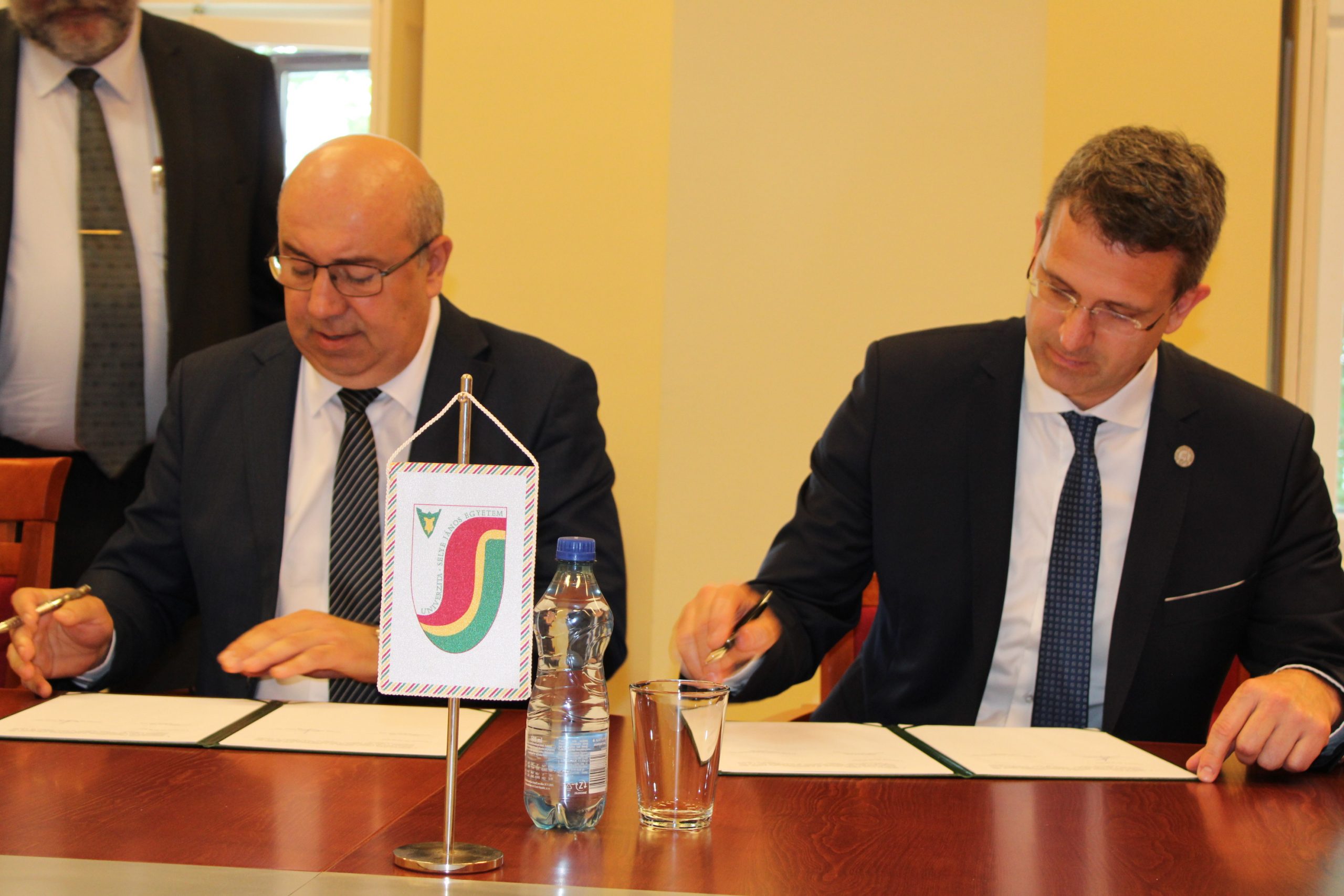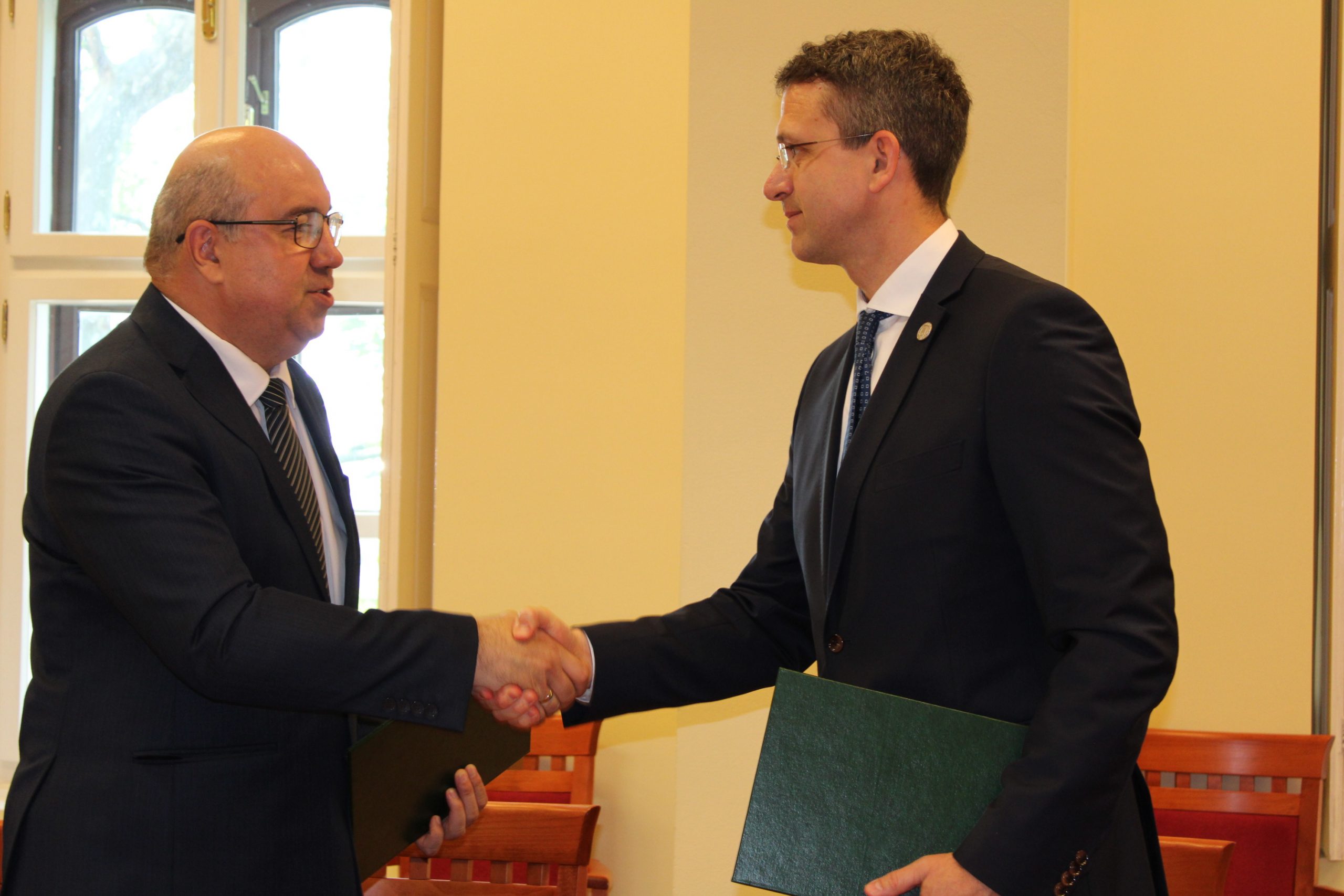President Jerguš Sivoš and Dean György Juhász signed a memorandum between the Institute of National Remembrance (Ústav Āmuri národa) and Āstav Āmuri národa University in a ceremonial setting this morning in the meeting room of the Rector’s Office.
He was present when the memorandum was signed Laszlo BukowskiState Commissioner for National Minorities of the Slovak Government, Joseph Bokor vice chancellor, Alfred Somogyi Dean and staff of the Institute of National Remembrance: Peter Jacek And Adela Martinkovicova. The event took place on the XX of the University’s Faculty of Religious Studies. And also to announce the founding of the Institute for Church History Research in the Nineteenth Century.
George Johasz In his welcome speech, he indicated that the basis of the mutual cooperation agreement between a state higher education institution and a large state institution is joint scientific cooperation, joint research and expertise. “The essence of our cooperation is scientific research in the recent past for a better understanding of the events of the twentieth century. Such scientific activity knows neither political ideology nor sexuality. It can only be quality.” He said.
As he said, the History Department of the Faculty of Reformed Religious Studies and the History Department of the Teachers’ Training College of their university are actively working, paying special attention to issues related to the history of Christian churches in Slovakia and the past of the Hungarians in Slovakia. “This meaningful work is manifested at the level of higher education and scientific research. The employees of the aforementioned departments have already published many valuable scientific and professional works, articles and studies in these fields, which contribute greatly to the knowledge of our common past. Without knowledge of this past, we cannot build a stable and progressive future.” “ said the rector.
He stressed that by signing the memorandum, the doors of the archives of the Institute of National Remembrance will be opened to researchers from their university, but it will also provide a broader scope for cooperation.
Thanks to this cooperation, it is possible to organize joint scientific conferences, joint activities, educational events, expert consultations during the preparation of seminars, master’s theses, diplomas, dissertations and dissertations, organization of joint publications, joint projects and the National Institute. Remembrance provides training courses for university students.
“So this cooperation not only affects the scientific field and not only benefits our historians, but will also have a direct impact on our educational activities, in which we also involve our students. Our university is supportive of free thinking, humanity, responsibility, democracy, creativity and originality of scientific research in higher education. In this way, Future cooperation will help achieve our mission, which is also formulated in the long-term development plan of our university. announce.
The signing of the Declaration of Cooperation brought its first result, since the History Department of the Reformed College of Theology decided to create a research group on church history, which would focus specifically on the events of the 20th century.
György Juhász said that the staff of the Faculty of Religious Studies would not only deal with the history of the Christian Reformed Church in Slovakia, but also with the history of other Christian churches and religious communities that were related to the Hungarians in Slovakia.
In the course of their scholarly research, they will also deal with the history of priests, chaplains, and congregations of various Hungarian parishes in Slovakia, and want to map the recent history of the Hungarian Christian and ecclesiastical community in Slovakia.

Jerguš SivošIn his speech, the President of the 20th Anniversary Institute highlighted the message of their organization, which is celebrating its 20th anniversary. Accordingly, its aim is to reveal the secret activities of the oppressive regimes that prevailed in the period between 1939-1989, to reveal those responsible for the crimes and murders committed by terrorism, moral and economic decline as well as destruction. Traditional principles of property rights, as well as political research as well as the search for persons responsible for their misuse for ideological purposes. As he said, one of the Institute’s missions is to remind the horrors of the Nazi and Communist regimes. Jerguš Sivoš pointed out that in addition to the many Slovak victims, there are also many Hungarian and other nationalities victims in the period between the two world wars and the period after.
He said that under the memorandum, the experts of the Institute of Remembrance will hold lectures at Celle Janus University, provide expert consultations in preparing seminars, basic theses and diplomas, theses, and cooperate in organizing scientific and professional conferences. seminars, support the university’s research activities, and mutually disseminate their results.
Jerguš Sivoš has stated that the Hungarian national minority is an essential part of a democratic Slovakia.
He noted that in today’s turbulent times, when historical events are often used for selfish ends, the success of the joint venture between the Slovaks and the Hungarians is important to their enterprise. He pointed out that the memorandum was signed in the spirit of mutual understanding and cooperation.
One of the “catalysts” for the cooperation agreement between the two state institutions announced at the festive event was government commissioner Laszlo Bukowski, who has been director of the archives department at the institute for many years. In his brief comment, he stated that the signing of the memorandum, in the preparation of which he was pleased to participate, was a historic moment.
He emphasized that in addition to guaranteeing minority rights and language rights, professional and research activities are equally important for Hungarian society – which is why the signing of the memorandum is exceptional.
He added that the results of the research should be publicly available and accessible to the younger generations, and they should be introduced to and reminded of our past. We must also avoid or prevent repeating the mistakes of our past, he said.
(Erika Szalay)












































